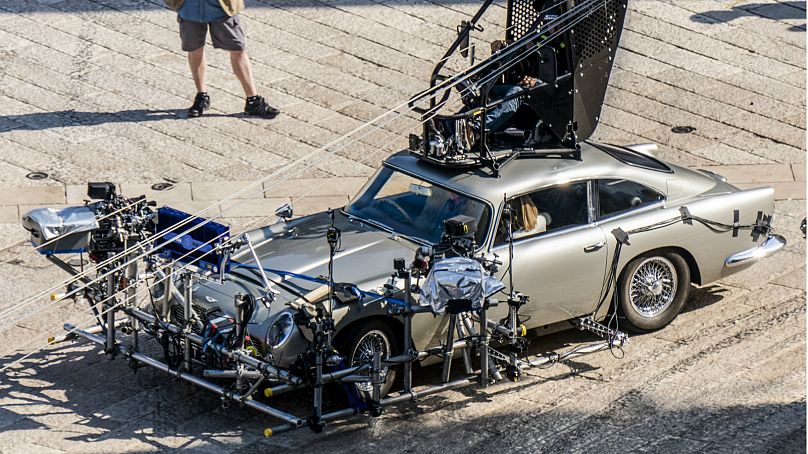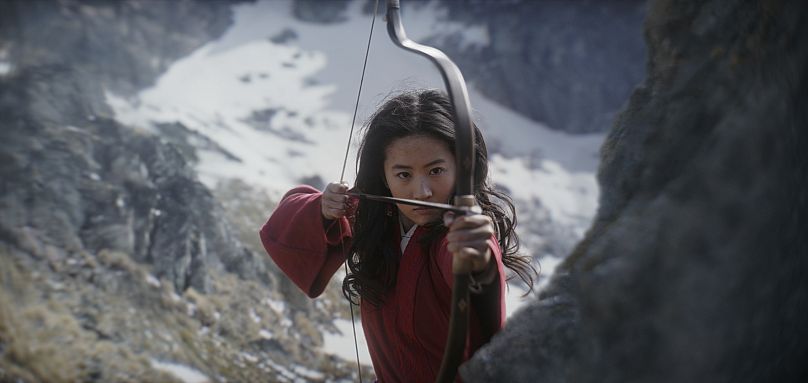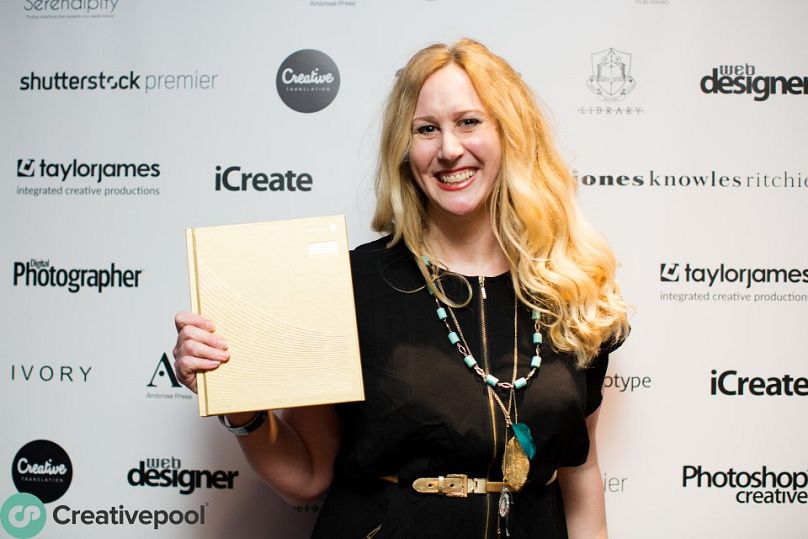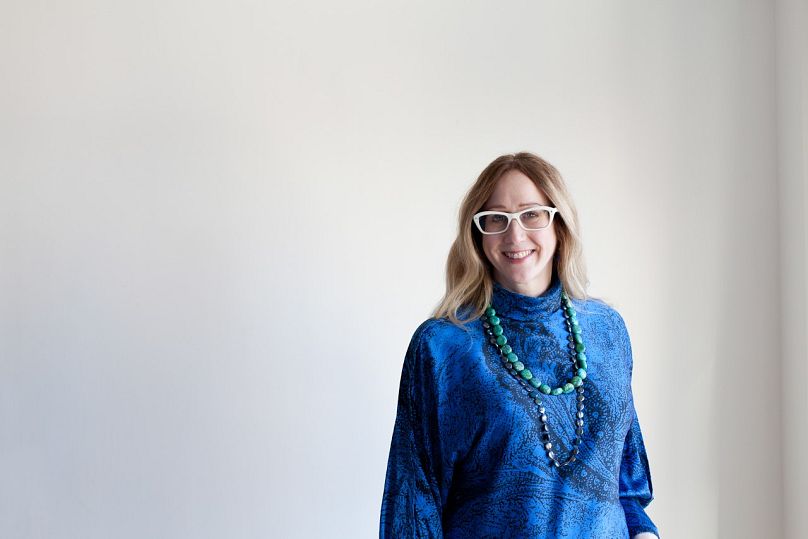'Filming won't be the same': Euronews speaks to those working in movies to get an idea of how coronavirus has changed the industry as we know it.
Coronavirus is having a devastating effect on those in the film business as box offices worldwide face losing billions, and stoppages in filming have left thousands in a mostly freelance industry without work.
Release dates, too, have been affected. The latest Bond movie — No Time to Die — was postponed until the end of this year, while Disney's live-action remake of Mulan has been pushed back to July.
But some studios have taken a different tack: Universal's Trolls World Tour was released on digital rental platforms earlier this month, and made nearly $100m (€91.9m) in its first three weeks — a figure higher than what the original Trolls movie made in five months showing in cinemas, according to The Wall Street Journal.
"The classic cinema chain is in trouble - but it was already in trouble anyway," Emmy Award-winning visual effects artist Doug Larmour (The Alienist; The Revenant) told Euronews, adding: "A lot of the smaller shows are deciding to release on streaming services.
"For people who own the streaming service, that's great, but it's not the $10 dollars you pay at the cinema."
The trouble with the pandemic, according to Larmour, is that some people may be "less likely" to watch new films at the cinema despite stringent stay-at-home measures beginning to lift. This was something widely reported in the days before some of Europe's lockdowns, and showed plummeting earnings at the box office were due to a feeling of reluctance from cinema-goers.
Social distancing and cinema
Oliver Meek, the executive director of the Rio Cinema in London, said work was already underway to prepare for a socially distant reopening.
The independent picture house in Dalston, where the main screen holds 400 seats in a 1930s auditorium, has been planning for several different scenarios for life after lockdown.
"We're looking at ways to allocate the seating so everyone can be two metres apart," Meek told Euronews.
He added: "This might mean we have to stagger people coming in, which keeps them longer on the door.
"Then we would need more trailers on the reel, and allow for more time between films.
"We want people to feel safe and comfortable, so we're hoping the government will release some detailed advice on this."
Cinemas in other countries, too, are getting creative. One theatre in Italy made the decision amid an easing of strict measures to move viewings outside and created a drive-in complex for several hundred cars.
The local government in Madrid, however, has funded a mobile cinema for people to watch films from their balconies.
And in Vilnius, the airport now houses a huge drive-in movie theatre.
But it's not all bad news for playhouses. Yes — social distancing will likely further impact box office takings — but Larmour suggests that many bigger budget movies would remain loyal to releasing to the big screen.
Examples of these blockbusters could include the releases that double up as "big events" themselves, said Larmour, such as anything from the Marvel Universe or the 007 franchise.
'No one is shooting at the moment'
Meanwhile, it's estimated that nearly 200,000 people will have lost their jobs due to the pandemic — an effect that could be prolonged while changes to the industry are made.
"The big problem is that no one is shooting anything at the moment," Larmour said. "I think they're starting again in Sweden and Denmark, but there is no one working in the UK, the US and most of mainland Europe."
Ridley Scott's The Last Duel, Marvel's Shang Chi, and Julius Avery's Samaritan are just a few of the productions that have been suspended by the outbreak.
Looking back to what we could learn from the outcome of the 2007-08 writers' strike — which saw 12,000 screenwriters in the US halt writing for 100 days — Larmour pointed to the lag it caused when one stage of production was disrupted.
He said: "It meant nothing got filmed. Then there was a lack of work later on.
"There will be a lag [this time, too], so there won't be any work in a couple of months' time for post-production."
'It took one hour to lose my contracts'
Production designer and art director Blair Barnette (Sightseers) told Euronews it took "one hour" on a day in mid-March for all four of her upcoming projects to be cancelled.
"That's nearly £40,000 (€46,000) that disappeared into thin air. As I'm freelance, I have no securities or options, so I was immediately unemployed with no notice and no further money coming into my account."
Barnette said it took a couple of days for "panic to set in" as she realised that the nature of her job would mean she could be out of work for at least another five months.
She added: "A lot of people have no buffer, as it’s hard enough to support yourself in the best of times for the majority of the people in the film industry.
"So a lot of people don’t have savings, and also have high overheads, so they need to be in work.
"The stress is always there to get money coming in. I see this bankrupting a lot of folks or forcing burgeoning companies into closing, making a prohibitive hardship for lots of the independents."
Filming won't be the same
Both Barnette and Larmour agree the production process and industry as a whole will need to change as it gets back on its feet.
For Barnette, she believes the industry won't see a "return to the salad days", but instead could see "more protocols and safety nets" put in place.
This sentiment was echoed by Larmour, who said he thought filming "wouldn't be the same" due to social distancing, while workers onset could be required to wear masks and undertake COVID-19 tests as they arrive each morning.
"You're not going to have big crowds, and you won't need as many extras because you won't be able to shoot that.
"In terms of restrictions, there will be more medical people on staff, more restrictions on set in what you can wear and how you interact with the actors. If one actor gets sick, the whole production will be in trouble."
With post-production work, Larmour said it was "really surprising" how quickly the industry was able to move to a remote set-up, despite usually being reluctant over confidentiality worries.
But with work ongoing in lockdown, he said studios had "broken the hurdle" and may become more accepting in the future for movie editing from home.
READ MORE:
- Madrid stages open-air cinema for confined locals
- People attend German concert drive-in cinema style
- Creative sector seeks support amid fears over impact of lockdown
Studios will be 'screaming' for content
A big break in creating new content could increase demand and cause a boom in creativity as normality begins to return post-lockdown.
"Streaming services are screaming out for content," Larmour said, adding: "Everyone will be screaming for content again - we’re very lucky in the UK and Europe in many ways because it's a very attractive place to shoot."
He said there could also be a "massive rush" to film during the summer months - a prime time for filming due to longer hours with sunlight, and a cheaper time of year.
But what does this mean for those right at the beginning of the filmmaking process, ie: the screenwriters?
According to Gordy Hoffman, the founder of BlueCat Screenplay Competition, a sense of "unstructured time" amid lockdown could lead writers to place extended pressure on themselves to write their legacy work.
Hoffman, who wrote Dog Bowl and Love Liza, then pointed towards the familiar anecdote of Shakespeare using quarantine amid the early seventeenth-century plague closures to write King Lear.
He said: "I feel like writers put pressure on themselves in normal times, the idea that writers have homework for the rest of their lives, so with all of this unstructured time, there’s even more pressure to write KING LEAR.
"So whatever emotional wrestling a writer might be normally facing is now worse."
Are there any upsides to take away from lockdown?
Yes there is, according to Barnette, who noticed "creativity is coming out of the woodwork".
She added: "People really have the time to just do and make stuff, spreading out into forums they would have never approached.
"Moms are signing up to TikTok and immediately getting thousands of followers, people are making dinners and crafting with their kids. Gardening, painting, doing stuff they never thought they had time to do.
"That is a beautiful thing to watch unfold and I don’t think it will just end once we are all allowed outside.
For screenwriters, Hoffman said the demand for stories may be on the rise, but this demand will also be for content that "speaks to the values we have reconnected with" during the lockdown.
"People have looked in the mirror in a way that hasn’t happened in anyone’s lifetime and this will change what we want from our storytellers.
"We will need laughter and we will need tears, but audiences will want honesty and specifics from the work of the writers."
Ending with some advice for those wanting to create during quarantine, he said: "Remember why you ever started. Everyone started somewhere. Who were you back then? That person is still inside of all of us.
"It’s a good time to rediscover what makes us grateful and keep our minds off when our careers will feel comfortable.
"Focus on how your story will be useful to your audience. Make yourself useful. Write for someone else.
"If we remember why stories mean anything to human beings, it’s easy to put down our 'challenges' and start typing."

















